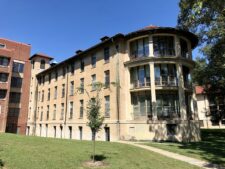Anyone who knows me for very long knows that I consider myself privileged and lucky to have been given the opportunity to attend the North Carolina School of Science and Mathematics for the last two years of high school. Of course, I attended more than three decades ago, but even today colleagues and friends will react to the news that I attended by commenting, “oh, that’s why you’re so good at math!”

I lived in the Beall Pavilion during my junior year at NCSSM. Hi Meep!
(Image: Warren LeMay)
During my junior year at NCSSM, I muddled through the lower-level Pre-Calculus course, but my grades were only barely high enough to advance to Calculus I during the first semester of my senior year. I should have paid attention to that; but I thought I could manage it. I couldn’t have been more wrong. I got lost during the very first week of class and, by mid-semester, wasn’t even bothering to attend; I knew there was no way I would pass the course.
After hearing how I struggled, my mother arranged for some private aptitude testing and the results were startling: I scored at or above the 95th percentile on most of the traditional academic general aptitudes, including some where I was at the 99th percentile. But my score on abstract and spatial reasoning was at the 27th percentile. This was an aptitude test, not a knowledge test, and my score was almost a full standard deviation below the mean. Were it not for the fact that I had already exceeded the state’s requirements for high school graduation, that score would have indicated a learning disability.
The real question was how I’d gotten so far before the problem was identified. Even though my mother was a master’s level teacher, it still took her a while to figure it out: I’d been doing math based on memorization and pattern recognition, two of the areas where I score very high. I’d gotten through algebra and geometry by recognizing and applying fairly complex patterns. But those techniques broke down after that level. With a lot of support, I might have been able to eventually pass applied calculus (calculus for business/social sciences), but I wasn’t going any further than that.
This was a limitation, but not a significant one, because I hadn’t wanted to be an engineer, an architect, or a computer programmer anyway. I’m numerically literate and functionally capable, but I haven’t done anything past high school level math since, well, high school. Over the past thirty-odd years, I have occasionally needed to go into elementary algebra and/or basic statistics, but arithmetic has usually been sufficient.
So, no, I’m not particularly good at math. What I am also not, however, is afraid of it, which means that when I need to do it, I don’t hesitate or feel additional stress. My mathematical ability, what there is of it, is just another tool in my personal skill set.
This is why, even though I myself will never make it to higher math and in fact, would probably need remediation to do college-level mathematics these days, I still insist that algebra and geometry have a place in the standard high school curriculum.
There are any number of examples for answering the assertion that algebra isn’t relevant to everyday life. It is. More than that, though, the fact that I have passed Pre-Calculus means that I am confident about my abilities in lower level mathematics, and that translates to seeing no need to avoid mathematical topics. I’ll wade right into discussions or problem-solving using numerical and statistical data, and if I see something that doesn’t look right, I’ll challenge it and even re-run the numbers myself.
One of my biggest personal triumphs was when I successfully argued, against a Ph.D.-level educator, that a particular regression analysis equation was inappropriate for determining pay equity. It failed to account for past institutional discrimination; in fact, in some of the sensitivity testing, use of that equation actually exacerbated the disparate impact. The decision maker, who also held a Ph.D., looked at the proposal and my rebuttal, and then told the educator that “if a student of mine had turned this in for an assignment, I would have failed them.”
Or, put more bluntly, the educator’s use of the term “statistical regression analysis” hadn’t intimidated me; in fact, I could clearly explain how, and why, that method made the problem worse instead of better. I was also able to propose an alternative method that used simpler mathematics.
That’s the value of not being afraid of math, even if I can’t always do it, and that’s the value of studying higher math. Even if a student never learns the methodology or uses it again, the ideas are no longer rendered opaque or mysterious. As I recently observed on Facebook, “the benefit of taking a course isn’t always [learning] the course material itself.” Sometimes the value is much more simple than that. Knowing that I have managed Pre-Calculus means that I know I can manage the math I actually have to do.